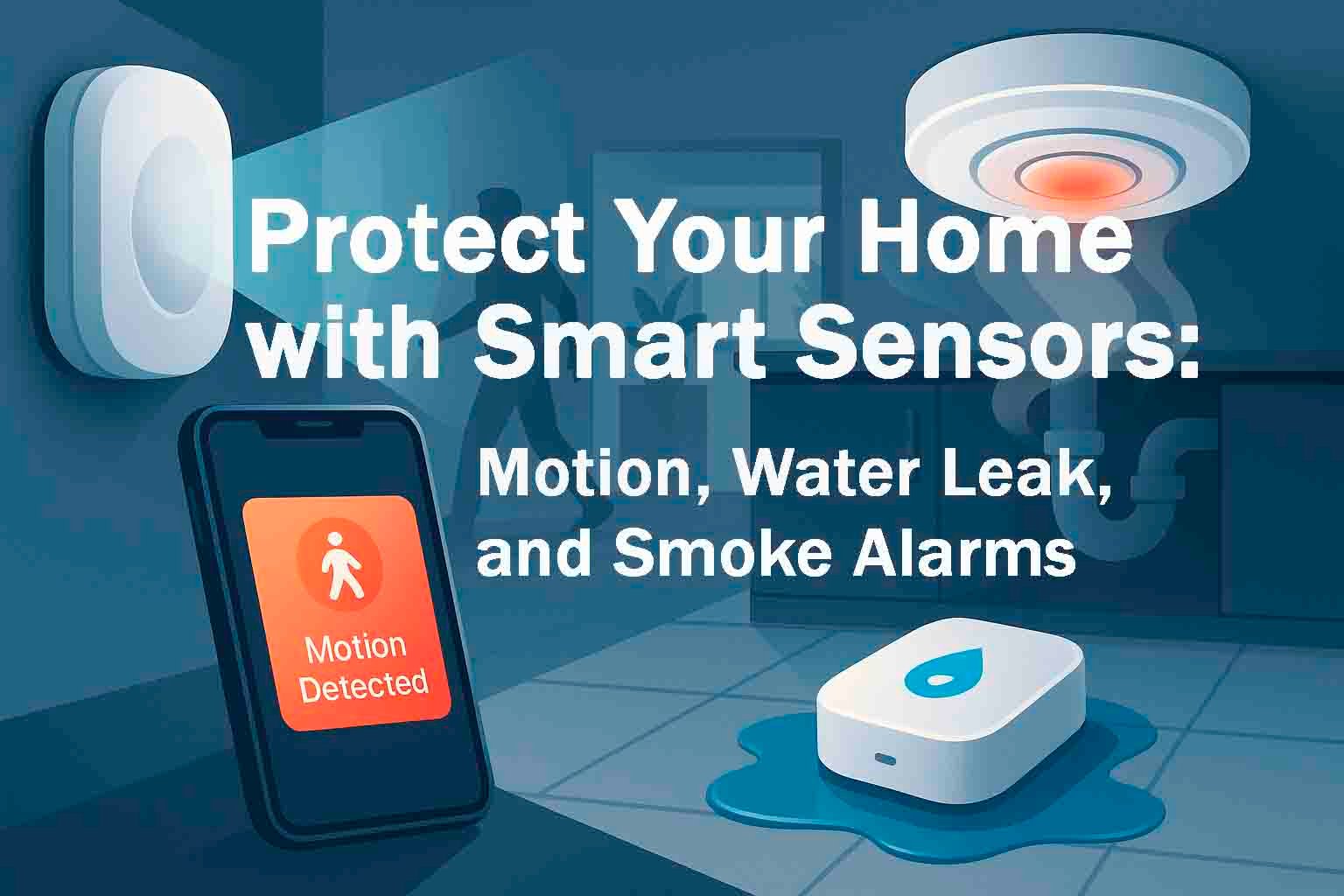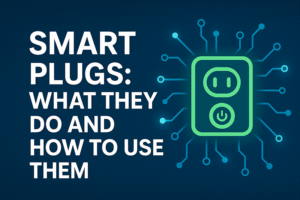Protect Your Home with Smart Sensors: Motion, Water Leak, and Smoke Alarms
Your home is more than just a building — it’s where you and your loved ones should feel safest. But threats like fire, water damage, or even intrusions can strike when you least expect them. Thankfully, smart sensors can now help you prevent disasters before they start.
In this guide, you’ll discover how motion, water leak, and smoke detectors can protect your home 24/7 — and why upgrading to smart technology is one of the best investments you can make.

Smart sensors are internet-connected devices that monitor specific conditions in your home — like motion, water leaks, or smoke — and alert you instantly via smartphone notifications, voice assistants, or alarms.
Unlike traditional detectors, smart sensors give you real-time insights, even when you’re not home, so you can act fast.
 1. Smart Motion Sensors: Know When Something Moves
1. Smart Motion Sensors: Know When Something Moves
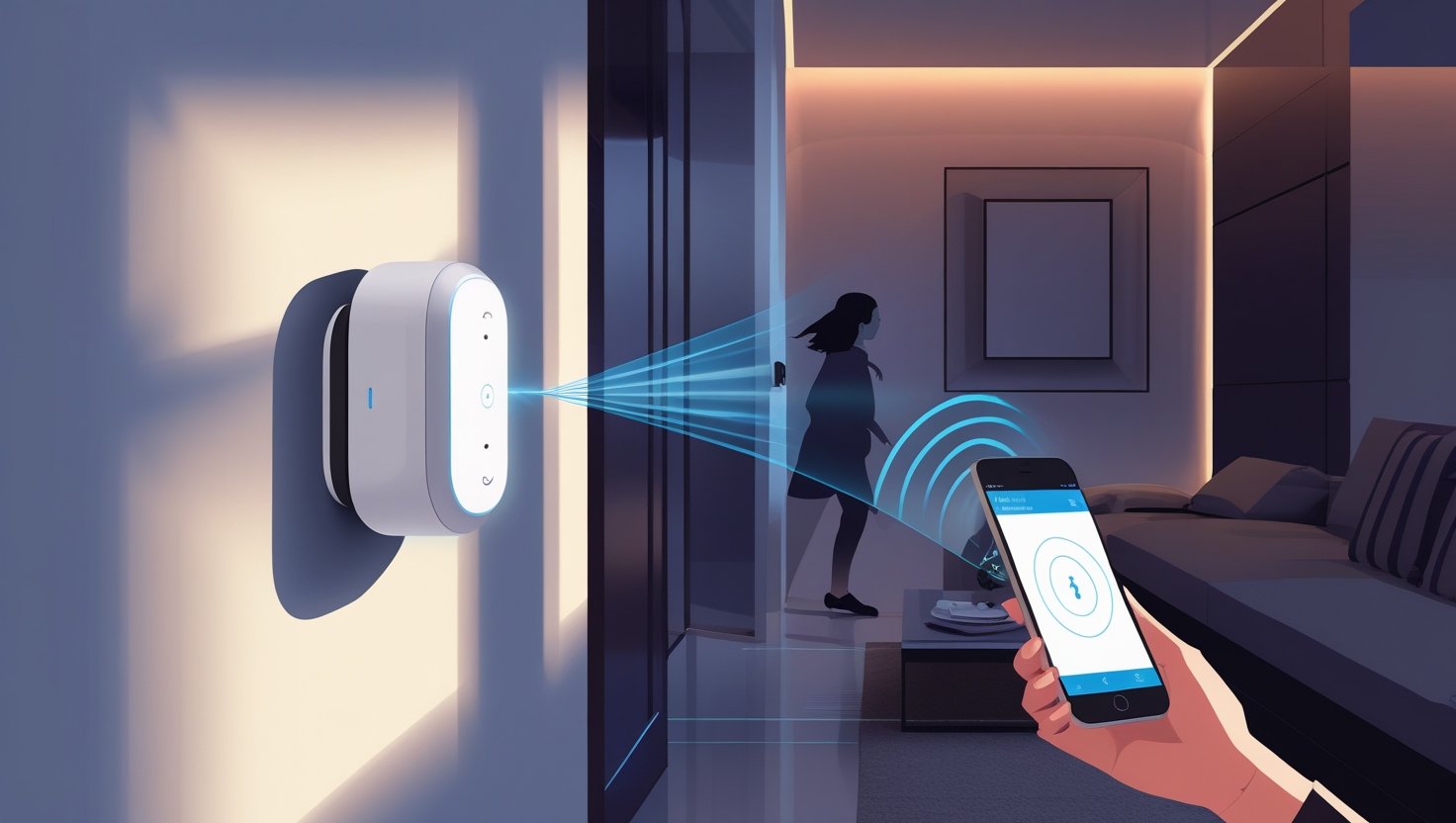
Smart motion sensors are essential building blocks of any modern smart home. These compact, high-tech devices detect movement within a specific area and instantly trigger alerts, automations, or even alarms — giving you real-time control and awareness of your home environment.
But they don’t just protect you from unwanted intruders — they also improve everyday convenience, energy efficiency, and comfort.
 Security First: Detect Intruders Instantly
Security First: Detect Intruders Instantly
Motion sensors are most commonly used as part of a home security system. When armed, they can:
-
- Trigger alerts to your smartphone or email if unexpected movement is detected
-
- Activate alarms or sirens to scare off potential intruders
-
- Record video footage by integrating with smart cameras or video doorbells
-
- Notify emergency services through professional monitoring systems
Many smart sensors also distinguish between pets and people, reducing false alarms caused by a cat or small dog.

Beyond security, smart motion sensors can trigger a wide range of automations that make your home more intuitive and efficient. Examples include:
-
- Turning on lights when you walk into a room, then turning them off when you leave
-
- Starting your morning routine by activating your coffee machine, music, or thermostat when motion is detected in the kitchen
-
- Lighting your path at night — for example, low light in the hallway when you get up for a midnight snack
These automations not only add convenience but also help reduce energy usage by ensuring devices are only on when needed.
 Seamless Integration with Smart Assistants
Seamless Integration with Smart Assistants
Modern motion sensors easily connect with popular smart ecosystems like:
-
- Amazon Alexa
-
- Google Home
-
- Apple HomeKit
-
- Samsung SmartThings
This allows you to create voice-activated routines and custom scenarios — for example:
-
- “Alexa, turn on hallway lights when motion is detected after 10 PM.”
-
- “Google, notify me if there’s movement in the garage while I’m away.”
Many sensors also include ambient light or temperature monitoring, adding even more flexibility to your smart home automations.
 What to Look for in a Smart Motion Sensor
What to Look for in a Smart Motion Sensor
When choosing a motion sensor, consider these key features:
| Feature | Why It Matters |
 Pet immunity Pet immunity |
Avoid false triggers from small pets |
 Connectivity Connectivity |
Wi-Fi or Zigbee/Z-Wave for wider compatibility |
 Battery life Battery life |
Long-lasting batteries or USB-rechargeable |
 Mobile alerts Mobile alerts |
Instant push notifications on your phone |
 Day/Night modes Day/Night modes |
Customize behavior based on time of day |
 Smart hub compatibility Smart hub compatibility |
Works with your existing devices and platforms |
 Best Placement Areas
Best Placement Areas
Strategic placement is critical for maximizing the effectiveness of your smart motion sensors. Ideal locations include:
-
- Entryways and hallways
-
- Living rooms and staircases
-
- Garages, basements, and attics
-
- Outdoor patios and driveways (weatherproof sensors only)
Avoid pointing sensors directly at heat sources or windows, as rapid temperature changes or sunlight may cause false triggers.
 Installation is Quick and Easy
Installation is Quick and Easy
Most smart motion sensors come with simple mounting options:
-
- Adhesive backing for no-drill installation
-
- Wall screws for more permanent mounting
-
- Magnetic bases for easy repositioning
Once mounted, setup is typically done via a smartphone app, with step-by-step guidance for pairing with your home network or hub.
 Final Word on Smart Motion Sensors
Final Word on Smart Motion Sensors
Smart motion sensors are affordable, versatile, and incredibly valuable. Whether you’re looking to boost home security, automate daily tasks, or simply make your life easier, these tiny devices pack a powerful punch.
If you’re just starting to build your smart home, a motion sensor is one of the best first steps — and a wise one at that.
 2. Smart Water Leak Sensors: Stop Damage Before It Spreads
2. Smart Water Leak Sensors: Stop Damage Before It Spreads
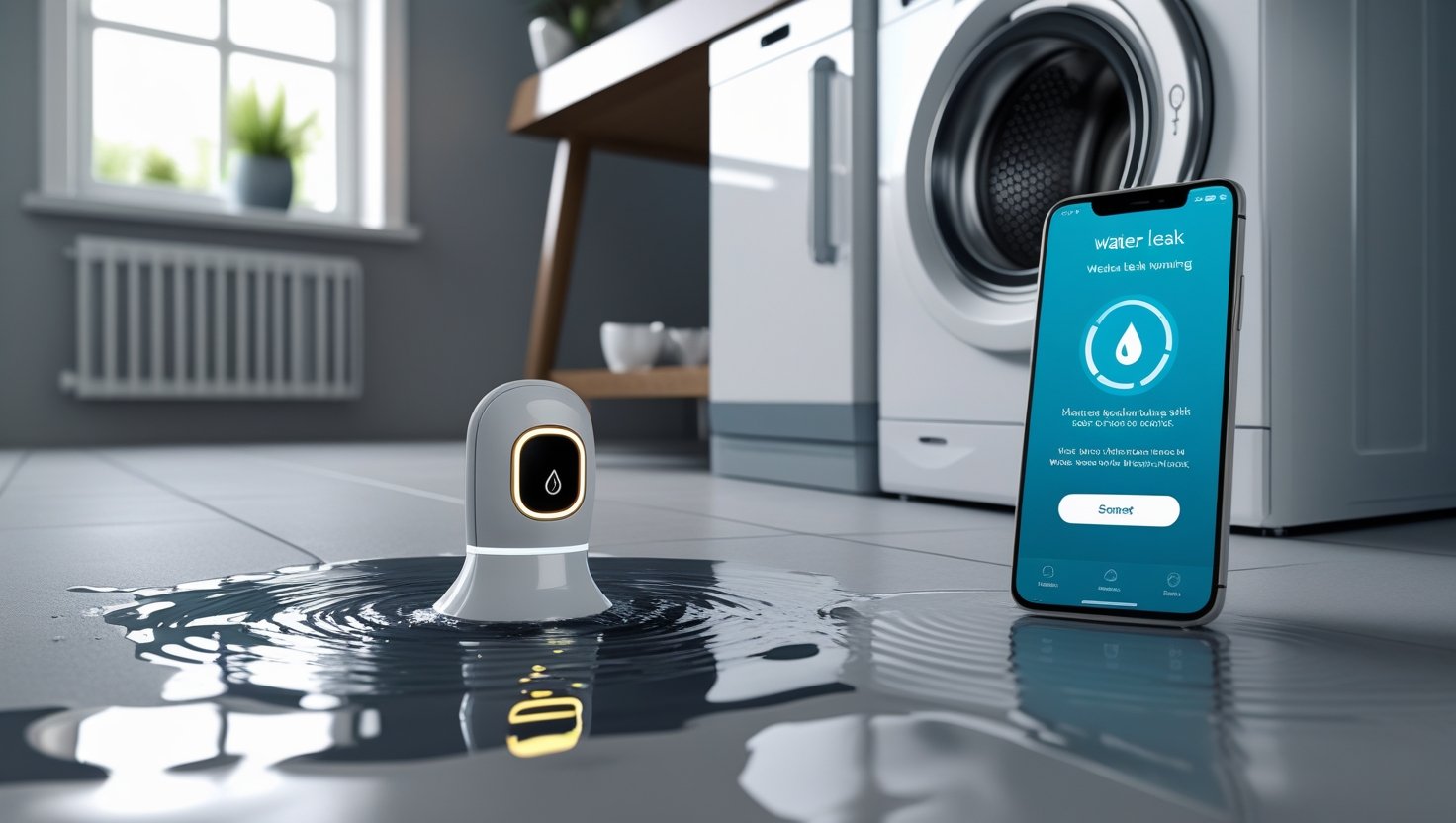
Water damage is one of the most expensive and frustrating problems homeowners face — often happening silently under sinks, behind appliances, or in the basement. But with smart water leak sensors, you can detect leaks early and avoid thousands of dollars in repairs.
These compact, battery-powered devices offer 24/7 protection and are a must-have for any connected home that values safety, prevention, and peace of mind.
 How Smart Leak Sensors Work
How Smart Leak Sensors Work
Smart leak detectors are equipped with moisture-sensitive probes that trigger an instant alert when they detect even a small amount of water. Once connected to your home Wi-Fi or smart hub, they can:
-
- Send real-time notifications to your phone
-
- Trigger audible alarms
-
- Automatically shut off water valves (if paired with a smart shut-off system)
-
- Activate other smart devices (e.g., turn on lights or cameras)

 Where to Place Water Leak Sensors
Where to Place Water Leak Sensors
For maximum protection, place smart water leak sensors in high-risk areas, such as:
| Location | Why It’s Critical |
| Under kitchen sinks | Leaky pipes and dishwashers |
| Near water heaters | Common point of failure |
| In bathrooms | Overflowing toilets or tubs |
| Next to washing machines | Hose ruptures or overflows |
| In basements | Flood-prone areas |
| Under refrigerators | Ice maker leaks or condensation |
Some advanced sensors also monitor humidity levels and temperature, helping you prevent mold growth or frozen pipes in colder climates.
 Integration with Smart Home Systems
Integration with Smart Home Systems
Smart water sensors are even more powerful when integrated into a smart home ecosystem. Many models work seamlessly with:
-
- Amazon Alexa
-
- Google Home
-
- Apple HomeKit
-
- Samsung SmartThings
-
- IFTTT (for creating custom automations)

 Key Features to Look For
Key Features to Look For
When choosing a smart water leak sensor, consider these important features:
| Feature | Why It Matters |
 Mobile alerts Mobile alerts |
Get notified wherever you are |
 Long battery life Long battery life |
1–3 years of maintenance-free use |
 High sensitivity High sensitivity |
Detects even a few drops of water |
 Smart integrations Smart integrations |
Works with your existing ecosystem |
 Compact design Compact design |
Easy to place in tight, hidden spaces |
 Built-in siren Built-in siren |
Local audio warning for immediate action |
Some premium models come with water shut-off kits, providing automatic prevention, not just detection.
Setting up a smart water leak sensor is simple:
-
- Place the sensor flat on the floor or attach it near a pipe using adhesive or screws.
- Pair it with your home network or smart hub via a companion app.
- Set alert preferences and optional automations.
No plumbing knowledge or special tools required — installation takes just minutes.
Even a small leak left unnoticed can lead to:
-
- Mold and mildew
-
- Warped floors and furniture
-
- High utility bills
-
- Expensive home insurance claims

 Final Thoughts: Small Device, Big Protection
Final Thoughts: Small Device, Big Protection
Smart water leak sensors are one of the most underrated smart home investments. Affordable, easy to install, and incredibly effective — they offer silent protection against one of the most common household threats.
Whether you live in a house or apartment, protecting your property from water damage is just a sensor away.
 3. Smart Smoke Alarms: Get Fire Alerts Anywhere
3. Smart Smoke Alarms: Get Fire Alerts Anywhere
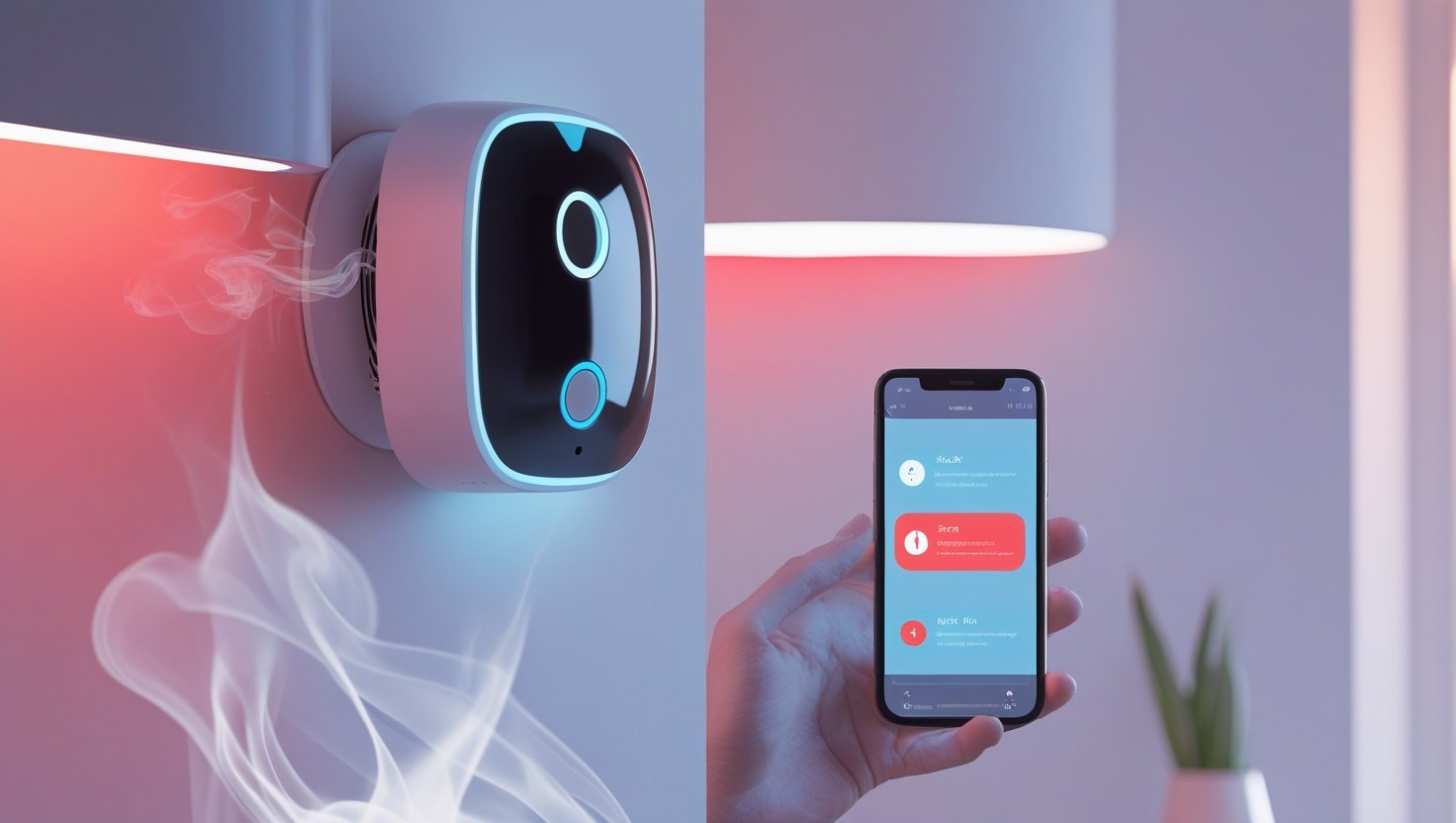
A traditional smoke alarm might beep when you’re home — but what happens if you’re away, at work, or even on vacanță? Smart smoke alarms take fire detection to the next level by combining early warning, mobile notifications, and intelligent features that help protect your family, pets, and home — no matter where you are.
They don’t just sound an alarm — they communicate.
 How Smart Smoke Detectors Work
How Smart Smoke Detectors Work
Unlike basic battery-operated smoke alarms, smart smoke detectors connect to your Wi-Fi or smart home hub and send real-time alerts directly to your smartphone. Here’s what makes them smart:
-
Instant mobile alerts in case of smoke or fire
-
Interconnected alarms – if one goes off, they all do
-
Voice alerts instead of beeping (on some models)
-
False alarm reduction with advanced sensors
-
Integration with smart systems like Alexa, Google Home, or HomeKit

 Dual-Sensing Technology: Smoke + Carbon Monoxide
Dual-Sensing Technology: Smoke + Carbon Monoxide
Many smart detectors come with dual sensors for detecting:
-
Smoke (from slow-smoldering or fast-burning fires)
-
Carbon Monoxide (CO) – a deadly, odorless gas
This dual protection ensures your home is covered from both visible and invisible threats.

 Where to Install Smart Smoke Alarms
Where to Install Smart Smoke Alarms
Proper placement is key for effectiveness. According to fire safety experts, install them in:
| Location | Reason |
| In every bedroom | Fires often start at night |
| Outside sleeping areas | Ensures everyone hears the alarm |
| In hallways or stairways | For early detection of spreading fire |
| In kitchens | Use models that minimize false alarms |
| In basements/attics | Fire-prone areas with appliances or wiring |

 Integration with Your Smart Home
Integration with Your Smart Home
Smart smoke detectors can trigger automated responses via your smart home ecosystem. Here are a few examples:
-
Turn on smart lights to illuminate escape paths
-
Unlock smart doors automatically
-
Activate indoor cameras or sirens
-
Send alerts to family members, neighbors, or caregivers
They work with platforms like:
-
- Amazon Alexa
-
- Google Assistant
-
- Apple HomeKit
-
- IFTTT
-
- SmartThings
 Key Features to Look For
Key Features to Look For
When buying a smart smoke alarm, consider these essential features:
| Feature | Benefit |
 Long battery life Long battery life |
Many models last up to 10 years |
 Mobile notifications Mobile notifications |
Instant alerts to your smartphone |
 False alarm prevention False alarm prevention |
Advanced sensors that detect real threats only |
 Multi-device connectivity Multi-device connectivity |
All alarms communicate with each other |
 Easy self-testing Easy self-testing |
Get alerts when batteries are low or test is due |
 Voice & light alerts Voice & light alerts |
Ideal for children, elderly, or hearing impaired |
 Easy Installation, Maximum Safety
Easy Installation, Maximum Safety
Installing a smart smoke detector is surprisingly simple:
-
- Mount it like a regular smoke alarm (ceiling or high wall).
-
- Use the brand’s mobile app to pair the device with your Wi-Fi.
-
- Configure alert settings, family contacts, and smart automations.
Some models are battery-operated, while others can be hardwired for constant power.

-
- Nest Protect
-
- First Alert Onelink
-
- Kidde Smoke + CO Alarm with voice alerts
 Final Thoughts: Peace of Mind Wherever You Are
Final Thoughts: Peace of Mind Wherever You Are
Smart smoke alarms offer a life-saving advantage over traditional detectors. Whether you’re home or away, they make sure you’re always in the loop when it comes to fire and carbon monoxide risks.
For just a small investment, you can enjoy:
-
- Real-time alerts
-
- Quicker response times
-
- Full integration with your smart home


Most smart sensors are wireless and easy to install — often with just a smartphone app and adhesive backing or screws. Many connect directly via Wi-Fi or use smart home hubs like:
-
- Amazon Alexa
-
- Google Home
-
- Apple HomeKit
-
- SmartThings
This allows you to build powerful automations, like turning off water valves when a leak is detected, or turning on lights and sending alerts when motion is triggered at night.

Smart sensors aren’t just a luxury — they’re a necessity in modern home protection. They offer:




Real Story: One homeowner installed a smart water leak sensor under their washing machine. Two months later, a hose burst while they were on vacation — the sensor alerted them, and they were able to shut off the water remotely. That $30 sensor saved them from thousands in water damage.

Here are our top recommended smart sensors:
-
- Motion Sensor: Philips Hue Motion Sensor
-
- Water Leak Detector: Govee Wi-Fi Water Sensor
-
- Smart Smoke Alarm: Google Nest Protect


Protecting your home doesn’t have to be complicated or expensive. With smart sensors, you gain peace of mind, faster responses, and a safer environment for you and your family — all with just a few easy-to-install devices.
Don’t wait for an emergency to take action. Equip your home with smart motion, water leak, and smoke sensors today — and stay one step ahead of danger.


